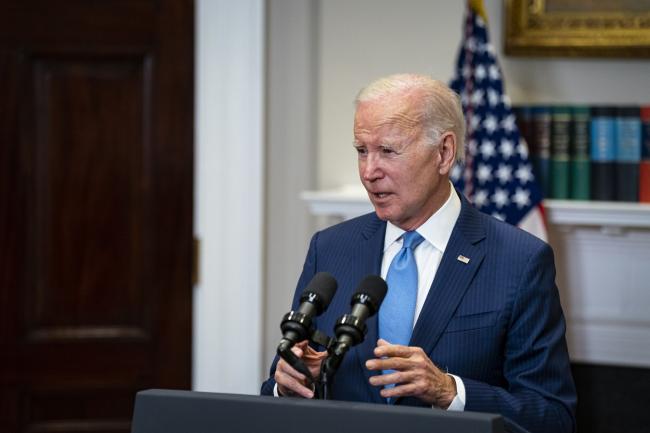(Bloomberg) -- President Joe Biden’s trip to Asia, intended to assure fretful allies that the US remains a reliable partner in the face of China’s assertiveness, is doing just the opposite.
What was billed as a three-nation tour to highlight the US commitment to Asia looks much-diminished after the White House said Biden will scrap stops in Papua New Guinea and Australia to focus on debt-limit talks with Republicans. He’s still going to a Group of 7 meeting in Japan where allies will confront what they call China’s economic pressure on less powerful countries.
The prospect that the US may default on its debt, coupled with Biden’s decision to return home earlier than planned, seem certain to undermine his message of strength and will draw inevitable contrasts to the image of steadfast economic might projected by China’s President Xi Jinping.
It’s a crucial moment: G-7 leaders gathering in Hiroshima want to send a message to China with their initiative combating “economic coercion.” The impetus has come from Biden, who urged partners to take a stronger stance against Beijing.
“These leaders are thinking about the risk to their economy if the US can’t get this done,” Josh Lipsky, a former International Monetary Fund and State Department official who’s now at the Atlantic Council, said of the debt-ceiling talks. “That puts the president of the US in a very difficult position of trying to unify the G-7 while there’s this potential looming situation that could be catastrophic for the global economy.”
But Biden downplayed the notion that the truncating of his travels would strengthen China in the region, saying that he will still meet with the Australian, Japanese and Indian leaders while in Hiroshima.
“No, because we’re still meeting, we still have four good allies,” he said shortly before departing the White House on Wednesday.
Past presidents have scrapped overseas trips to deal with crises back home, but rarely has the partisan rancor felt so extreme or risked tanking the global economy. And no other US leader made the contest with China — not to mention the idea that “America’s Back” after four years of President Donald Trump — so central to to their approach to the rest of the world.
The prospect of a Trump rematch next year and Biden’s flailing poll numbers only add to doubts about his ability to persuade nations in the region to turn away from Beijing.
Biden said Tuesday that “the nature of the presidency is addressing many critical matters all at once.” He said he was cutting his trip short “in order to be back for the final negotiations with the congressional leaders” and that he remains “confident that we’re going to continue to make progress toward avoiding default.”
Biden’s travel to Japan underscored that the White House thought the downsides of staying home from that meeting, at least, were too great. One foreign diplomat, who asked not to be identified discussing private deliberations, said skipping the G-7 would have undermined a sense of unity toward China.
The trips to Papua New Guinea and Australia are seen as less urgent, even though the symbolism will be striking.
Biden was set to meet Papua New Guinea’s prime minister, James Marape, in the first-ever visit by a US president. Xi was there in 2018 for a summit that former President Trump decided to skip. The Chinese leader also met Marape in Bangkok last year.
Read More: US, EU to Boost Security Tools as G-7 Eyes Economic Coercion
The US had wanted to use Biden’s trip to Australia to demonstrate the strength of its deepening alliance after the US and the UK announced a deal that will send nuclear-powered submarine technology to the ally. Australia had said earlier Tuesday that Biden had planned to address Australia’s parliament.
“It’s tough to ‘compete with China’ in the Pacific when you’re busy sinking your own boat,” former Deputy Assistant Secretary of State Evan Feigenbaum said in a tweet. “And how do we think we look to the rest of the world?”
A statement from the White House said Biden spoke with Australian Prime Minister Anthony Albanese, and offered him a state visit “at a time to be agreed” as a consolation.
Marape got no such offer, an omission that will grate for Pacific island nations that have complained of US neglect. The White House statement didn’t even mention Marape by name, saying only that the White House “engaged” with his team.
One European diplomat said Washington dysfunction now appeared to be the norm, citing repeated disputes over the debt limit in the past decade-plus and previous government shutdowns. Others have sought to be far more diplomatic, especially in their public remarks.
“I hope everyone is mature in this situation and avoids further risks for the global economic development,” German Finance Minister Christian Lindner told CNBC last week.
The European diplomat said there’s some frustration with the US’s approach to China, with some allies feeling Washington lacks a clear strategy to execute its goals.
Bonnie Glaser, a managing director at the German Marshall Fund, said any agreement coming out of the G-7 meeting would be “significant” but said it’s too early to judge how successful it might be.
“Even if they’re all on the same page in terms of the need to take up the issue among the seven countries, it still doesn’t tell us what actions they’re willing to take,” she said.
